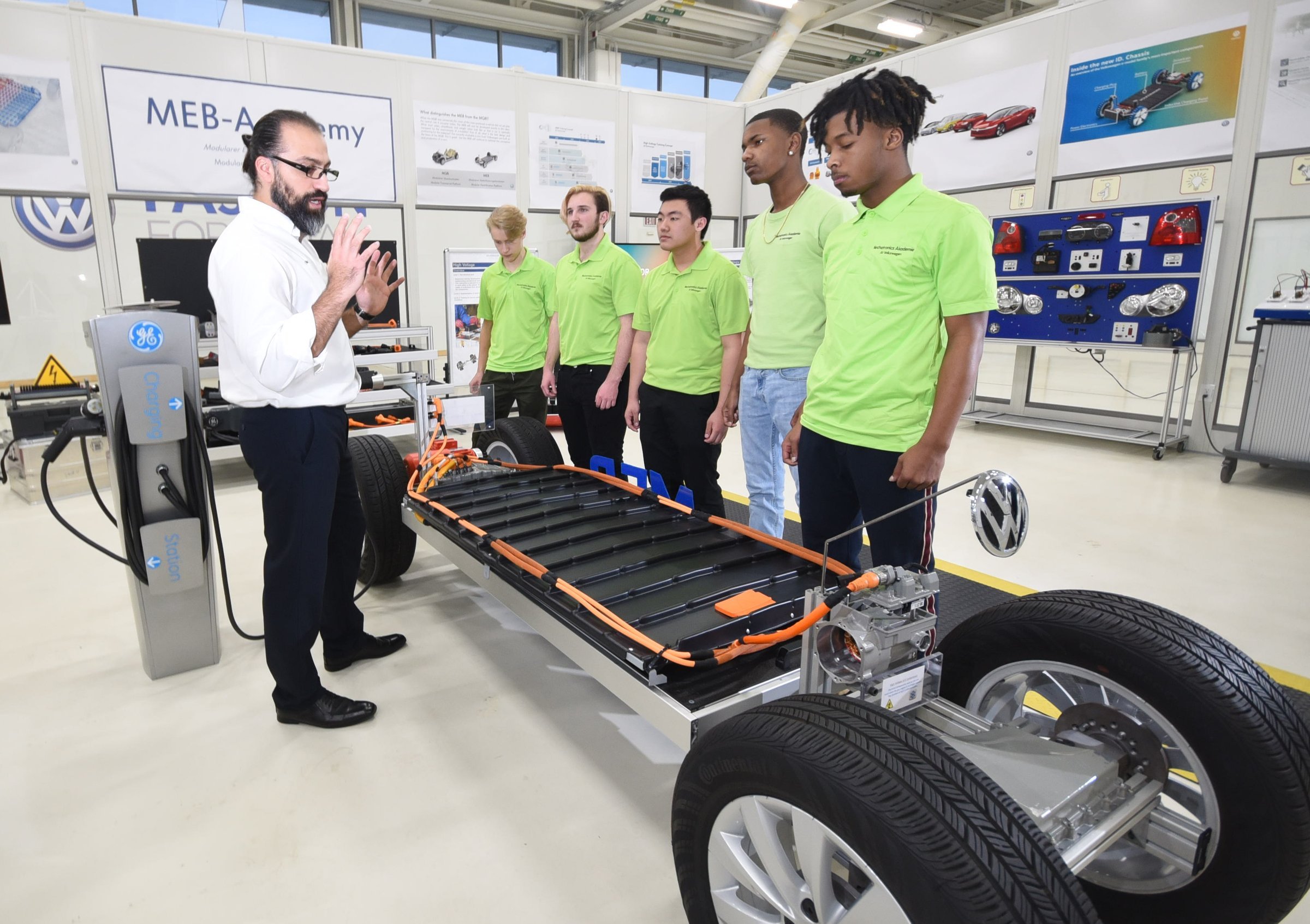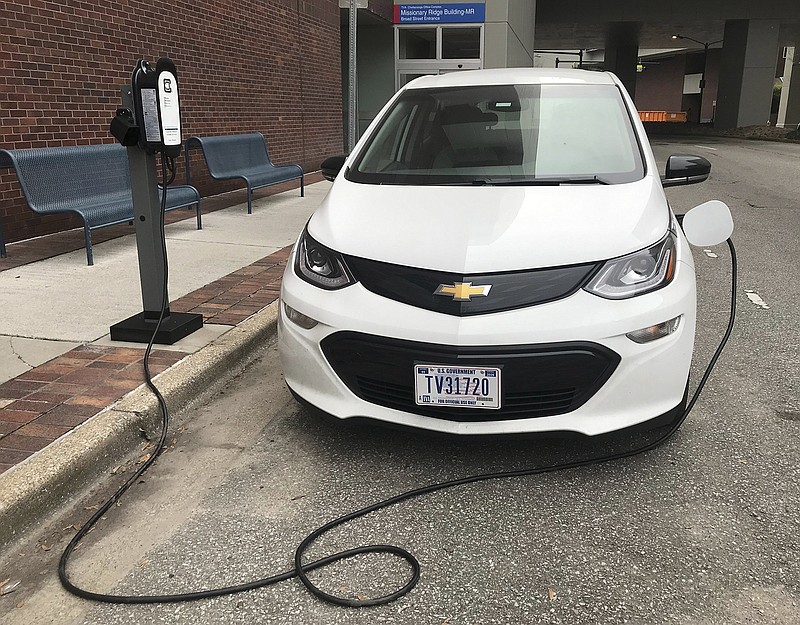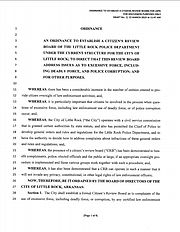The gas-powered automobile has been an engine of economic growth in Tennessee, accounting for nearly a half million jobs in the Volunteer State making vehicles for Volkswagen, Nissan and General Motors, supplying parts for a range of cars and trucks and driving and servicing such vehicles across an array of industries.
But a new study released Friday suggests that the rise of driver-less cars and the transition to electric vehicles will alter, or could even displace, nearly one in six jobs in Tennessee as transportation is reshaped by autonomous and battery-powered vehicles in the future.
Dr. William Fox, director of the Boyd Center for Economic Research at the University of Tennessee, said the changes in the types and ways vehicles are driven is creating both a challenge and an opportunity for Tennessee. Electric and autonomous vehicles will require new ways of financing roads and new and different skills for workers making and servicing cars and trucks, but as an early adopter of the new technology Tennessee could get ahead of some states in the transportation transformation.
"It is important to remember that new vehicle-related jobs will be created, as will other jobs in the economy," Fox said Friday. "Tennessee must transform aggressively if it is to be an economic leader as these many changes occur, and a big challenge is helping existing workers transition to the new opportunities."
BY THE NUMBERS
* $5,000 - Estimated savings per household from shared mobility with autonomous vehicles* 72,507 - Vehicle manufacturing jobs in Tennessee in 2017, most of them focused on gas engines* 119,000 - Number of Tennesseans who work at auto dealerships, gas stations, repair shops and tire stores built on individually owned cars, rather than shared mobility model* 291,000 - Number of Tennesseans employed in driving jobs for trucks, delivery and emergency services that could ultimately be displaced by autonomous vehicles.* $2.3 billion - Taxes collected annually from gas and diesel sales and vehicle registrations and taxes, which are used to fund the state's transportation network of roads and highways. Electric and shared vehicles driven autonomously will undermine most of that funding model and require a new tax system for roads.Source: "Potential Impacts on Autonomous Vehicles on Tennessee's Economy," Boyd Center for Business and Economic Research at the University of Tennessee at Knoxville.
Nissan and Volkswagen are already making or developing production facilities for electric vehicles in Tennessee and the Oak Ridge National Laboratory is researching technologies for autonomous vehicles. Those auto makers and research facilities are likely to benefit by the shift in transportation.
In Chattanooga, VW has begun an $800 million expansion of its assembly plant and is hiring 1,000 more workers to make an electric-powered Sports Utility Vehicle.
The Tennessee Valley Authority, the nation's biggest government-owned utility which pioneered the first electric vehicle test track in Chattanooga in the 1970s, is preparing to change its transmission network to recharge more electric vehicles.
"We're now studying what we need to do to prepare for EVs (electric vehicles) and what that means for our generation and transmission networks," TVA President Jeff Lyash said Friday.
While some businesses may benefit, many others will be challenged by the changes.
Tennessee is a major shipping center employing thousands of truck drivers and home to 917 automotive-related manufacturers in Tennessee produce parts or service the gas- or diesel-powered internal combustion engine, according to the Tennessee Department of Economic and Community Development. Tennessee is home to both one of the world's biggest privately owned shipping company, FedEx in Memphis, and the largest chain of truck stops, the Knoxville-based Pilot Corp.
In a new 34-page study on how driver-less cars will reshape the Tennessee economy, Fox and his research associates at the University of Tennessee said vehicles of the future will drive a different business model for one of the state's biggest industries.
Shift in automotive jobs
Tennessee employs more than 140,000 workers in vehicle manufacturing and support jobs, state figures show.
"Many of these workers may lose their positions or transition to making very different parts, because electric cars have fewer components," the UT study concluded.
Current vehicles are estimated to derive their value from 90 percent hardware and 10 percent software. But autonomous vehicles, or AVs, could be 60 percent software and 40 percent hardware, Fox said.
Electric cars may also be assembled with far fewer workers. An electric motor has only 17 parts, compared to the 1,200 parts in an eight-cylinder engine.
About 119,000 Tennesseans work in vehicle support jobs at automobile dealerships, gas stations, auto repair shops and maintenance or tire stores. The UT study found nearly all of those jobs will change drastically because fleet ownership of autonomous cars is more likely than individual ownership.
"You would request a car, much like you do with a taxi or Uber now," Fox said. "That means you're not taking a car to the repair shop, you're not filing it up with gas, and you're not budgeting for new tires."
Fox estimates that such shared mobility will save the average Tennessee household up to $5,000 a year. But the study found that 291,000 Tennesseans work as truck drivers or other vehicle drivers, including ambulance, police, fire and delivery services, and many of those jobs could be in jeopardy in the future.
To prepare for the shift in jobs and transportation, Tennessee will need to change the way students and adults are trained and educated, the way infrastructure is built, and the regulations in place for vehicles, Fox said.
 Staff photo by Tim Barber Hamilton County students, from right, Javier Favors, Jordan Kirby, Aaron Bun, Miles Matthews and Marko Burdeiniy, listens closely as Ilker Subasi, left, assistant manager of technical training at Volkswagen Chattanooga, reveals the change from the Automation Mechatronics Program to the MEB electric training program and the tools that will needed to produce electric vehicles at Volkswagen during an open house at Volkswagen Academy Thursday night, Feb. 21,2019. The modular electric platform shown is used for training purposes.
Staff photo by Tim Barber Hamilton County students, from right, Javier Favors, Jordan Kirby, Aaron Bun, Miles Matthews and Marko Burdeiniy, listens closely as Ilker Subasi, left, assistant manager of technical training at Volkswagen Chattanooga, reveals the change from the Automation Mechatronics Program to the MEB electric training program and the tools that will needed to produce electric vehicles at Volkswagen during an open house at Volkswagen Academy Thursday night, Feb. 21,2019. The modular electric platform shown is used for training purposes.
Replacing the gas tax
Electric vehicles will also undermine the current financing method for roads, streets and bridges in Tennessee. The state currently derives about $2.3 billion a year from taxes on gasoline, tires, and vehicle sales, as well as motor vehicle registration and rental surcharges - roughly 16 percent of the state's total tax revenue-and much of that would be at risk with electric and autonomous vehicles. A new funding method for roads and streets will be required to replace the gas tax, Fox said.
Changing the tax structure now will keep revenue consistent so roads, bridges, and other infrastructure can be maintained. Such changes will need to account for the evolution of autonomous and electric vehicles and the likely difference in adoption schedules between urban and rural areas of the state,
"Current policy that taxes fossil fuel likely leaves many rural residents and businesses paying an uneven share of the burden because they will change to AVs more slowly," Fox said. "Urban dwellers are already used to ride sharing, so those areas will shift more rapidly to the use of AV fleets that will be taxed much less with the existing structure."
Fox presented the report to the Tennessee Department of Finance and Administration to help state officials begin to prepare for the coming changes. Fox said it is unclear the pace at which electric and autonomous vehicles will be adopted in the state, but he said the long-term trend lines seem clear that such vehicles are coming and will ultimately displace most of the gas-powered driving vehicles of today.
Fox also noted that the pace of adoption for new technologies in quickening, citing both the smart phone and internet technology that was widely adopted in only a fraction of the time it took America in centuries past to gain widespread use of the automobile or electricity.
"The big unknown is when all of this will happen, but adoption rates for new technologies are occurring much faster than in the past," Fox told the Chattanooga Times Free Press. "Does Tennessee want to be a leader or a follower in this emerging industry?"
Contact Dave Flessner at dflessner@timesfreepress.com or at 423-757-6340.

